by Lisa Cooke | Oct 20, 2015 | 01 What's New, Android, Apps, iPad, Mobile
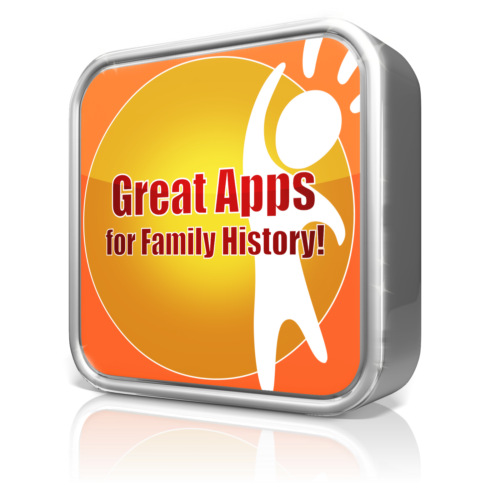 Looking for family history apps? Check out these recent recommendations.
Looking for family history apps? Check out these recent recommendations.
Recently Diane Haddad over at Family Tree Magazine featured 5 fun family history apps on the Genealogy Insider blog. She kindly shared them with us. (Thanks, Diane!)
1. Today In History provides headlines, quotes and images of important historical events from today’s date in history. It’s available for iPad and Android (Diane had to keyword-search its creator, Downshift LLC, to find it in the Android App Store).
2. Streetmuseum from the Museum of London lets you see the streets of your London ancestors. Select a destination from a London map or use your GPS to locate an image near you. Hold your camera up to the present day street scene and see the same London location from years ago on your screen. Information buttons give you historical facts. It’s available for iPad and Android.
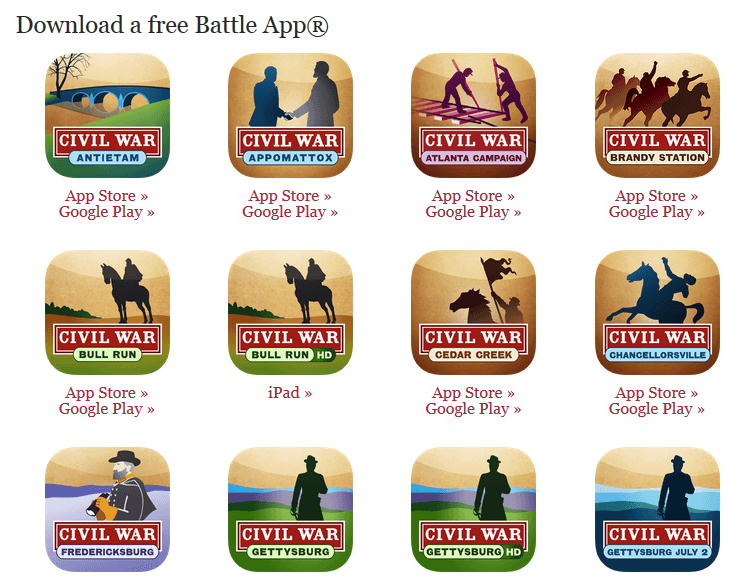 3. Civil War Battle Apps from the Civil War Trust are GPS-enabled guides to 17 well-known Civil War battles. Use them at the battlefield for a self-guided tour or remotely for a virtual tour. The battle maps show your location on the battlefield, and many have time-phased maps that show where Union and Confederate units were located at key moments. You also can see videos with experts and hear accounts from those who fought. These are available for iPad and Android.
3. Civil War Battle Apps from the Civil War Trust are GPS-enabled guides to 17 well-known Civil War battles. Use them at the battlefield for a self-guided tour or remotely for a virtual tour. The battle maps show your location on the battlefield, and many have time-phased maps that show where Union and Confederate units were located at key moments. You also can see videos with experts and hear accounts from those who fought. These are available for iPad and Android.
4. Biblion: The Boundless Library from the New York Public Library draws on the library’s records, photos, ephemera and other archival collections to take you on a tour of the 1939-40 New York World’s Fair. (A second edition of Biblion covers the writing of Mary Shelley’s Frankenstein.) Available for iPad.
5. History Here, a location-based app from the History Channel, lets you learn about thousands of historical places all over the United States. You can let your GPS set your location to learn about nearby historic sites, or choose any location in the app. Available for iPad and Android.
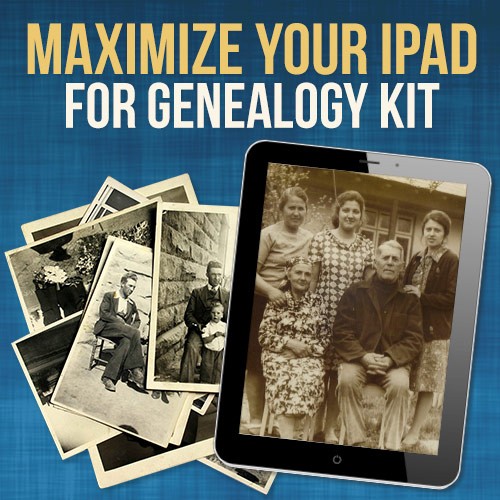 We love these family history app recommendations! Family Tree Magazine sells a great Maximize your iPad for Genealogy Kit on their website, which includes a webinar I did for them called “iPad: Your Ultimate Genealogy Tool” and an e-book version of my book Turn Your iPad into a Genealogy Powerhouse.
We love these family history app recommendations! Family Tree Magazine sells a great Maximize your iPad for Genealogy Kit on their website, which includes a webinar I did for them called “iPad: Your Ultimate Genealogy Tool” and an e-book version of my book Turn Your iPad into a Genealogy Powerhouse.
More Resources from Genealogy Gems on Mobile Genealogy:
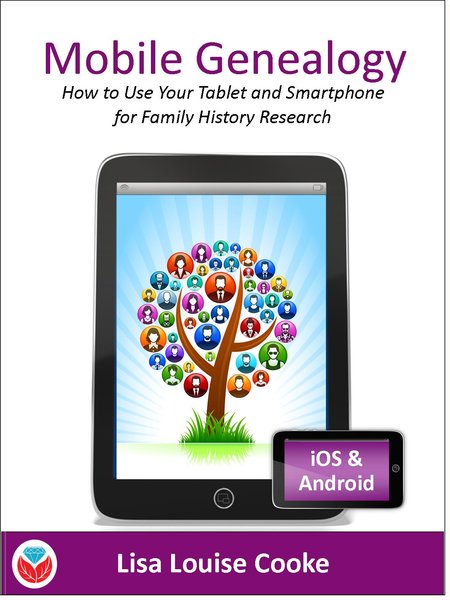 Mobile Genealogy: How to Use Your Tablet and Smartphone for Family History Research (2016 print book)
Mobile Genealogy: How to Use Your Tablet and Smartphone for Family History Research (2016 print book)
7 Great Ways to Use Your iPad for Genealogy and Family History
Video: Genealogy on the Go with the iPad (Premium website subscription required)
by Lisa Cooke | Apr 8, 2015 | 01 What's New, Digital Archives, Libraries
The 40 millionth record has been added to WorldCat, the enormous multi-library catalog that helps people find library materials all over the 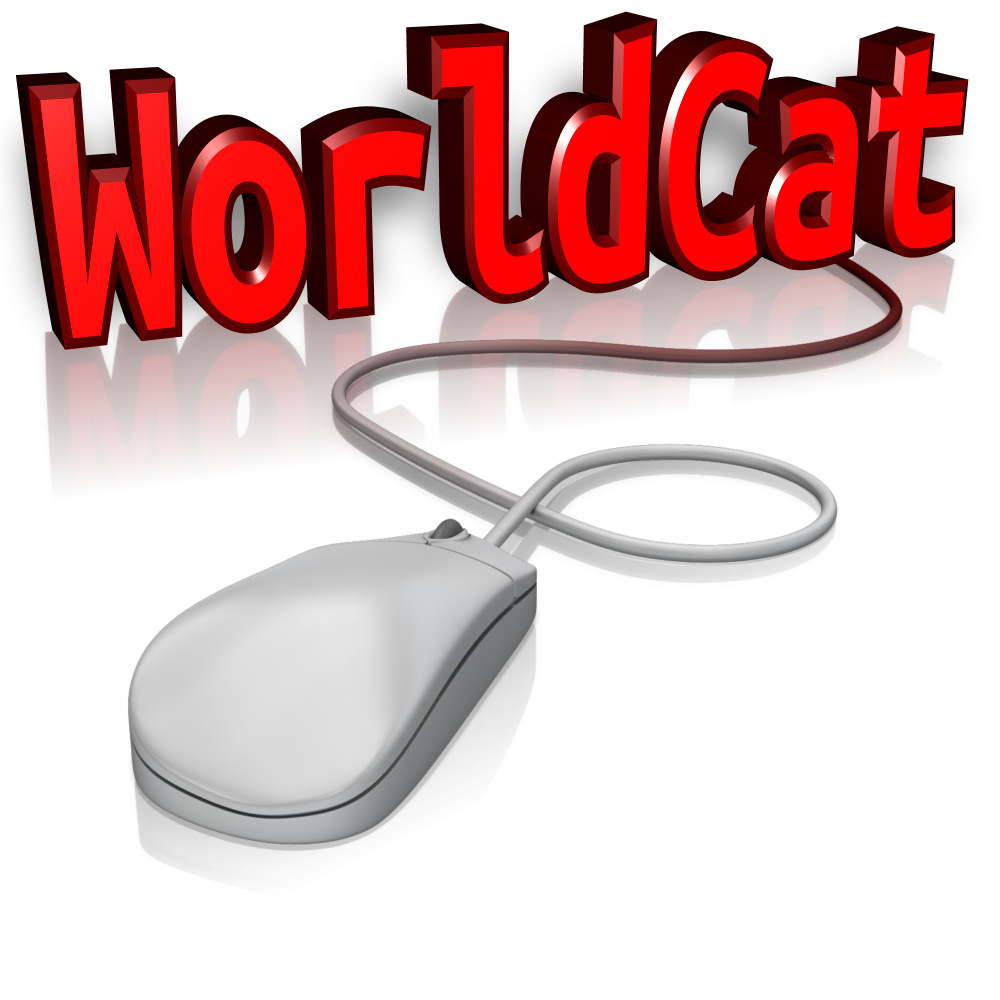 world.
world.
Even cooler, that 40 millionth record was harvested to WorldCat through the WorldCat Digital Collection Gateway. This gateway allows for “unique, open-access digital content” to be brought into WorldCat, according to owner OCLC. “Once there…collections are more visible and discoverable to end users who search WorldCat as well as Google and other popular websites.”
If you haven’t used WorldCat for genealogy, you may be missing out on a lot. Like published history books (regional, county, local, ethnic, religious and more). And published family histories (search by the surname as a subject). The holdings of the enormous Family History Library in Salt Lake City, Utah are now included in WorldCat, too (click here to read a blog post on that).
The idea that digital archives are integrating into WorldCat–hence becoming more searchable for us–is fantastic. What kinds of digitized materials might be cataloged here? Well, the Arizona Memory Project is the digital archive that provided that 40 millionth WorldCat record. The Arizona Memory Project “provide(s) online access to the wealth of primary sources in Arizona libraries, archives, museums and other cultural institutions including government documents, photographs, maps and objects that chronicle Arizona’s past and present.” Good stuff!
Remember to also search ArchiveGrid, WorldCat’s sister search interface for archival materials, for original family history documents.
by Lisa Cooke | Nov 9, 2012 | 01 What's New, NARA
 Washington, DC . . . Today, the U.S. District Judge Catherine Blake sentenced Jason Savedoff to twelve months and one day in prison, plus two years probation, for conspiracy and theft of historical documents from cultural institutions in four states, including the Franklin D. Roosevelt Presidential Library in Hyde Park, New York.
Washington, DC . . . Today, the U.S. District Judge Catherine Blake sentenced Jason Savedoff to twelve months and one day in prison, plus two years probation, for conspiracy and theft of historical documents from cultural institutions in four states, including the Franklin D. Roosevelt Presidential Library in Hyde Park, New York.
Among the items known to be stolen from the Roosevelt Library, which is part of the National Archives and Records Administration, were seven “reading copies” of speeches that President Roosevelt delivered. They contained President Roosevelt’s edits and handwritten additions, along with his signature. The speeches have all been recovered.
Savedoff’s co-conspirator, Barry Landau, pled guilty, and was sentenced on July 28, 2012, to seven years in prison and three years of supervised release.
Archivist of the United States David S. Ferriero thanked the Maryland Historical Society, the National Archives’ Holdings Protection Team and Office of the Inspector General, and the U.S. Justice Department, for bringing the case to justice. He stated: “Close coordination with these tireless stewards allowed us to stop Jason Savedoff and Barry Landau, to build a case against them, and to bring them to justice.”
The Archivist continued, “The security of the holdings of the National Archives is my highest priority. I will not tolerate any violation of the law that protects both records and property that belongs to the U.S. government and the American people.
“The National Archives does not stand alone. All repositories of historical records and artifacts are faced with the serious challenge to keep their holdings secure. Any theft of our nation’s records is an irreplaceable loss. We at the National Archives must remain constantly vigilant, to ensure the protection of our nation’s precious heritage, while at the same time balancing the right of every American to have access to original records.”
Under the current leadership, the National Archives has become more vigilant, including by ensuring the establishment of the Holdings Protection Team to assess, determine, and implement security measures to ensure the public’s access to their holdings. The Holdings Protection Team has instituted a program of security studies, risk assessments, and increased security, monitoring, and screening at National Archives facilities nationwide. The Holdings Protection Team provides training to National Archives archivists and research room staff (and other employees), as well as to staff at other institutions, all aimed at increasing awareness and communication of security issues. The National Archives has also instituted a number of other measures aimed at preventing theft, such as closed-circuit cameras, exit searches, mandatory staff training, and outgoing mail inspections.
According to court records, seven “reading copies” of President Roosevelt’s speeches were stolen when Savedoff and Landau visited the Roosevelt Presidential Library on December 2, 2010.
“Reading copies” are the actual copies of the speeches from which the President read. They contain edits and handwritten annotations made by him and bear his signature.
Four of these “reading copies” of speeches were sold to a collector on December 20, 2010, for $35,000. Three other “reading copies” of inaugural addresses delivered by President Roosevelt were recovered elsewhere. Each was valued at more than $100,000, and one was the water-stained reading copy of the inaugural address President Roosevelt delivered in a steady rain in 1937.
The National Archives and Records Administration is an independent Federal agency that preserves and shares with the public the permanent records of the U.S. Government that trace the story of our nation, government, and the American people. From the Declaration of Independence to accounts of ordinary Americans, the holdings of the National Archives directly touch the lives of millions of people. The National Archives carries out its mission through a nationwide network of archives, records centers, and Presidential Libraries, and on the Internet athttp://www.archives.gov
by Lisa Cooke | Jan 13, 2015 | 01 What's New, Australian, British, Findmypast, Irish, Military, Records & databases
Did your Irish ancestors have a dog? Over 3.5 million Irish Dog Licence registers have been added to a collection already online at
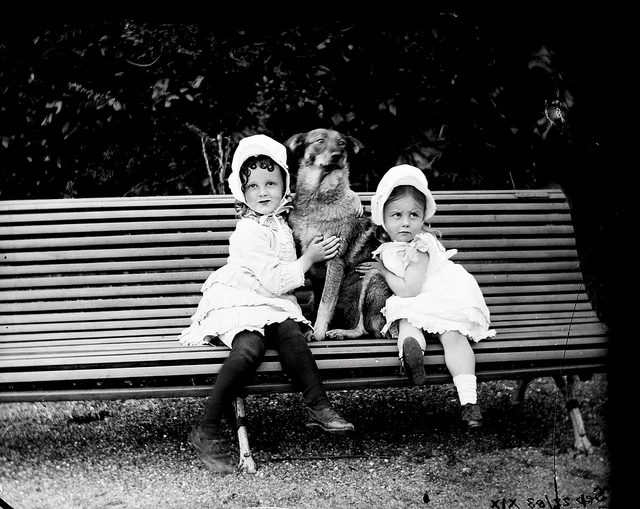
“More Besties from the Clonbrock Estate.” Taken September 22, 1883. National Library of Ireland photograph, posted at Flickr Creative Commons National Library of Ireland on the Commons page. No known copyright restrictions.
FindMyPast. “Now containing over 6 million records, the Irish Dog Licences list not only the name, breed, colour and sex of your ancestor’s four legged friend, but also the owner’s address and the date the licence was issued, making them a valuable census substitute,” says a recent FMP press release.
Also new on the site are other notable collections, as described by FMP:
- Trade Union Membership registers (3.4 million+ records) with digitized images of original records books from 9 different unions. The documents include details about individual members such as payments made, benefits received, names of spouses, and a number of unions published profiles of their members or those who held offices. Many unions kept detailed records for when a member joined, paid their subscription, applied for funeral benefits or superannuation (retirement). These records allow you to follow your ancestor’s progress within the union and perhaps uncover previously unknown details of their working lives and careers. The documents can also include details about the trade unions themselves, such as directories of secretaries, meeting dates and times and items of trade union business. Many trade unions also included international branches from Ireland to Australia to Spain and Belgium.
- Indexes to over 28,000 articles in 2000+ PERSI-indexed periodicals. These include magazines, newsletters and journals, according to location, topic, surname, ethnicity and methodology. (Learn more about PERSI on FindMyPast in our blog post on the topic.)
- Peninsular War, British Army Officers 1808-1814 dataset, compiled by Captain Lionel S. Challis of the Queen’s Westminster Rifles shortly after WW1. Using Army lists, Gazettes, despatches, official records and regimental histories, Challis gathered information on more than 9,600 officers who fought for control of the Iberian Peninsula during the Napoleonic Wars and recorded them on index cards. Each record contains an image of the original handwritten index cards and a transcript.
- South Australia Births 1842-1928. Over 727,000 records and date back to when the compulsory registration of births first began in 1842. Sourced from an index transcribed by volunteers from the South Australian Genealogy and Heraldry Society Inc., each records consists of a transcript that usually includes the child’s full name, gender, date of birth, place of birth and registration number. The names of both parents will also be included and in some cases the mother’s maiden name will also be present. South Australia’s colonial origins are unique in Australia as a freely settled, planned British province.
- South Australia Marriages 1842-1937 contain over 457,000 records. Each record includes a transcript that can contain a variety of information such as the first and last names of the bride and groom, their ages, birth years, marital status, the date and place of their marriage as well as their fathers’ first and last names.
- South Australia Deaths 1842-1972 contain over 605,000 records and span 130 years of the state’s history. Each record consists of a transcript that usually lists the deceased’s full name, gender, status, birth year, date of death, place of death, residence, the name of the informant who notified authorities of their death and their relationship to the informant.
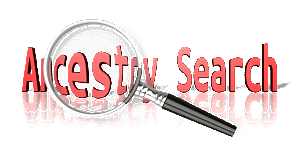 Are you making the most of your online searches at FindMyPast and other genealogy websites? What about on Google? Learn more about search strategies that work in this blog post!
Are you making the most of your online searches at FindMyPast and other genealogy websites? What about on Google? Learn more about search strategies that work in this blog post!
by Lisa Cooke | May 31, 2015 | 01 What's New, Digital Archives, FamilySearch, images, Libraries

A milestone 200,000 digital family history books are now online at the multi-library Family History Books collection at FamilySearch.org. The growing collection, which began in 2007, includes “family histories, county and local histories, genealogy magazines and how-to books, gazetteers, and medieval histories and pedigrees,” according to the landing page.
Last time I looked for books here, I found one on my Homer ancestors. This time around, I found another gem: a book of children’s stories written about these ancestors! Digitally-archived volumes like county and local histories, published family histories and others are so valuable because they are immediately accessible and because they are keyword-searchable. Try these keyword search strategies:
- Look for only a surname (in case the first name is written different ways or a different relative is mentioned).
- Search for the name of a neighborhood, street, church, school, business, type of work or other keywords that pertain to your family.
- Use the Advanced Search feature to focus your search for a keyword in a title, type of publication (periodical, etc).
Once you’re reading a book, you can click on the info icon (a circle with an “i” in it on the upper right) to see more information about the book, including source citation and copyright information.
While the number of volumes online skyrockets, the online Viewer for reading them is only gradually improving. Here’s a TIP from FamilySearch staffer Dennis Meldrum: “Safari does not work well with the Viewer.” Neither do mobile devices like the iPhone or iPad. “The Viewer works best with IE or Firefox. It also works with Chrome, but the Adobe Tools do not work. We are aware of the limitations of the Viewer and are working to replace it by the end of the year.”
 Want to keep track of which genealogy books are on your shelf and which you’ve found online? Create an Evernote genealogy library! Click here to learn how to do that with books on your shelf, and then add additional titles with the links in Evernote. Sharpen your Evernote skills for genealogy by becoming a Genealogy Gems Premium member. This gives you a full year’s access to our Ultimate Evernote for Genealogy Education, with five (so far) full-length video classes for beginner to expert and five mini-sessions, too.
Want to keep track of which genealogy books are on your shelf and which you’ve found online? Create an Evernote genealogy library! Click here to learn how to do that with books on your shelf, and then add additional titles with the links in Evernote. Sharpen your Evernote skills for genealogy by becoming a Genealogy Gems Premium member. This gives you a full year’s access to our Ultimate Evernote for Genealogy Education, with five (so far) full-length video classes for beginner to expert and five mini-sessions, too.
![]() Looking for family history apps? Check out these recent recommendations.
Looking for family history apps? Check out these recent recommendations. 3. Civil War Battle Apps from the Civil War Trust are GPS-enabled guides to 17 well-known Civil War battles. Use them at the battlefield for a self-guided tour or remotely for a virtual tour. The battle maps show your location on the battlefield, and many have time-phased maps that show where Union and Confederate units were located at key moments. You also can see videos with experts and hear accounts from those who fought. These are available for iPad and Android.
3. Civil War Battle Apps from the Civil War Trust are GPS-enabled guides to 17 well-known Civil War battles. Use them at the battlefield for a self-guided tour or remotely for a virtual tour. The battle maps show your location on the battlefield, and many have time-phased maps that show where Union and Confederate units were located at key moments. You also can see videos with experts and hear accounts from those who fought. These are available for iPad and Android. We love these family history app recommendations! Family Tree Magazine sells a great Maximize your iPad for Genealogy Kit on their website, which includes a webinar I did for them called “iPad: Your Ultimate Genealogy Tool” and an e-book version of my book Turn Your iPad into a Genealogy Powerhouse.
We love these family history app recommendations! Family Tree Magazine sells a great Maximize your iPad for Genealogy Kit on their website, which includes a webinar I did for them called “iPad: Your Ultimate Genealogy Tool” and an e-book version of my book Turn Your iPad into a Genealogy Powerhouse. Mobile Genealogy: How to Use Your Tablet and Smartphone for Family History Research (2016 print book)
Mobile Genealogy: How to Use Your Tablet and Smartphone for Family History Research (2016 print book)
 world.
world.



